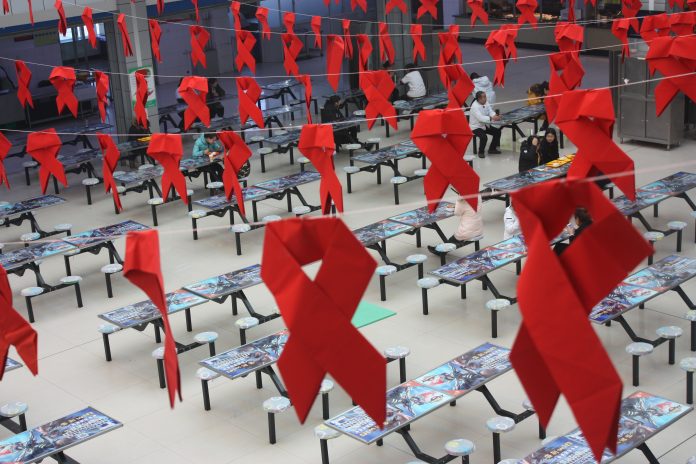In this article, HIV activist Philip Baldwin illuminates issues surrounding women and HIV for International Women’s Day 2019
On International Women’s Day 2018, I attended the Catwalk for Power, organised by Positively UK and Act Up Women. The event took place in Brixton and drew together HIV positive women from different backgrounds, in solidarity and to celebrate friendship, family, love and living happily with HIV.
Last year’s Catwalk for Power included speeches, poetry readings, as well as a catwalk featuring gloriously attired HIV positive women. It was great to see these empowered women confront the stigma of HIV head on. The Catwalk for Power will be taking place again on Saturday 9 March in London and, later in the year, catwalk projects will taking place in Brighton and Manchester.
A key figure behind the Catwalk for Power is Silvia Petretti, who has recently been appointed CEO of Positively UK. Silvia has been living with HIV for 22 years and has long been an important force within the HIV campaigning community. Approximately a third of people living with HIV in the UK are female and a quarter of new diagnoses occur among women. For many years their voices were not heard, a situation which is now changing because of activists like Silvia and events like the Catwalk for Power.
In September 2015, Positively UK released a report entitled Women Know Best. This drew on a conference, much research, as well as years of providing peer support for HIV positive women led by HIV positive women.
What I found most shocking in the report was the disproportionately high levels of intimate partner violence experienced by women living with HIV. This ranged from psychological abuse, threats to reveal a woman’s HIV status on social media, to violence, including rape. A study carried out at the Homerton Hospital in 2012 showed that 52% of HIV positive women had experienced intimate partner violence, with 14% experiencing this in the last year.
Positive Voices, the largest national survey on quality of life for people with HIV, conducted by Public Health England (PHE), found that in 2017 one in 16 women living with HIV identified need of support for domestic violence.
A number of factors coalesce to make women living with HIV particularly vulnerable. These factors include women often being the first to be diagnosed with HIV in a family during pregnancy, meaning that they are perceived as having brought HIV into the home, social isolation, including rejection by faith communities and friends, as well as language problems (if English is not their first language).
According to PHE, four out of five women living with HIV are migrants and two in three are of black-African ethnicity. Women are more likely to be care-givers and to be in circumstances where they are not financially independent or lack power in their relationship, increasing partner dependency to healthcare access.
They often deal with the dual stigma of HIV and domestic violence. It is not hard to see how this can become a self-perpetuating cycle, layered with shame. Consequently, women living with HIV are often diagnosed late. In 2017 a half of new HIV diagnoses among women occurred late.
It is not hard to see how this can become a self-perpetuating cycle, layered with shame.
The Women Know Best report identified a number of areas where improvements were urgently needed, including better data collection, more female representation within HIV advocacy, improved peer support, educating healthcare professionals about HIV and gender-based violence, as well as empowering women living with HIV so that they can live the fullest lives possible.
PHE found that two out of every five women with HIV had used HIV support services at some point following their diagnosis, with the vast majority (88%) saying this support had been important for their health and wellbeing.
I was fortunate to host a reception in Parliament in May 2016 with Silvia and Positively UK, which sought to raise awareness around the issues faced by women living with HIV. There has definitely been positive change over the last two and a half years. I am involved with LGBT, as well as HIV, campaigning. Within both fields there is now an increased awareness around intersectionality, meaning that the voices of women, minorities such as the BAME community and disabled people are increasingly heard.
Furthermore, once an HIV positive person is on effective treatment they cannot pass the virus on. Increased knowledge of the undetectable equals untransmittable messaging is liberating for many women living with HIV, as it simplifies telling partners about HIV, as well as motherhood. There is also an increasing amount of peer support and mentoring aimed at women, such as that found at Positively UK.
For International Women’s Day this year, Positively UK is organising the largest national gathering of women living with HIV, the I Am Here Festival, with the sole purpose of enabling women with HIV to step up into leadership and increase their ability to self-care.
Progress is slow though and huge challenges remain.
Positive Voices estimated that nearly half of HIV positive women in the UK who needed peer support services did not receive it. The Invisible No Longer report, released by the Terrence Higgins Trust and the Sophia Forum in April last year, found that 58% of women living with HIV had experienced violence. This is a similar statistic to that found in the Homerton study. Invisible No Longer confirms the scale of the issue, but more data is still required around women living with HIV and intimate partner violence.
more data is still required around women living with HIV and intimate partner violence.
This International Women’s Day we need to amplify the voices of all women, particularly those living with HIV who may be experiencing intimate partner violence. We need to listen, learn and empower so that women living with HIV finally get equal access to treatment and prevention.
To learn more about the Catwalk for Power and Positively UK’s work, please check out their website here.











